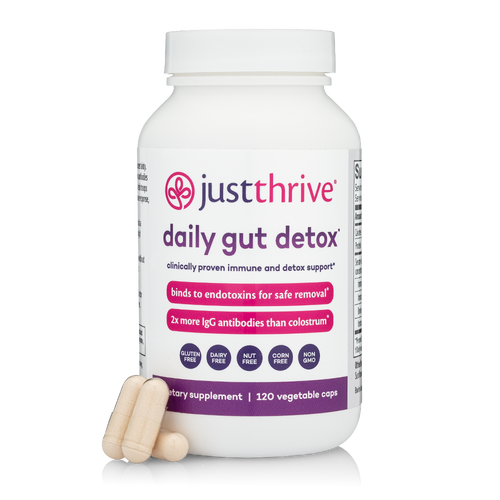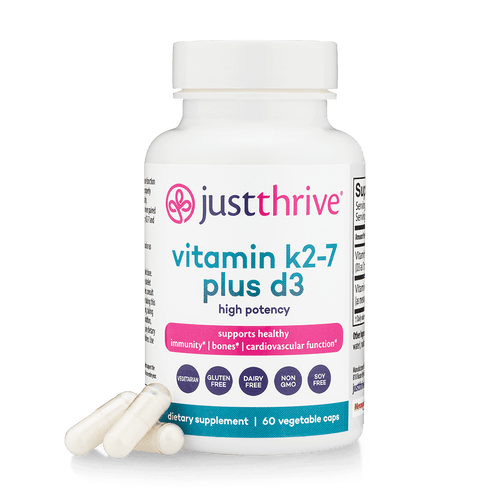The surprising connection between circadian rhythms and your immune system
If you’ve been having trouble sleeping… your whole body feels like it’s off course… or you seem to be catching everything going around… your biological clock might be out of whack.
Circadian rhythms lie at the heart of your wellness. And if your internal clock isn’t keeping the correct time, your immune system can get disrupted. That can throw your body clock off even more, so you never feel quite right.
Your immune system and your circadian rhythms are so intertwined that even slight disturbances in one can interrupt the other.
But, you can keep your immune function and your biological clock on schedule with the right support.
Circadian Rhythms Run Your Life
Your body has an internal clock that regulates all essential biological functions.[1] That clock runs on circadian rhythms, the 24-hour cycles, largely based on light and dark.
It’s most known for regulating your sleep-wake cycles, but that’s just one small piece of your body’s time puzzle.
Circadian rhythms also manage:
- Hormone production
- Body temperature
- Heart rate
- Appetite
- Digestion
- Immune function

Practically every tissue and organ follows its own circadian rhythm, under the direction of your body’s master clock called the SCN (suprachiasmatic nucleus). The SCN coordinates those individual rhythms to keep everything ticking at the right time. Light and dark have the heaviest influence on your circadian rhythms, but they can be affected by other factors such as stress, health conditions such as ADD and depression, vigorous activity, and meal timing.[2]
And if any of those knock your body clock off course, your immune system can get knocked down too. That’s because your immune function is heavily dependent on circadian rhythms.[3]
Your Immune System Follows Its Own Clock
Circadian rhythms have a huge influence on your immune system, down to specific immune cells.[4] That means your ability to fight off infections, respond to vaccines, or deal with threats varies depending on the time of day. And that goes for all types of immune functions including things like inflammatory responses.
Most types of immune cells have internal clocks, and their activity levels depend on timing.
- Macrophages—white blood cells that kill threatening microbes and signal other immune cells into action—follow their own circadian rhythms.[5]
- T-cells (also known as lymphocytes) also follow their own time cycles as they help fight infections, respond to vaccines, and attack cancer cells.[6]
- Immunoglobulin G (IgG, also called antibodies) are your body’s first-line defenders against pathogens and toxins and are most present and active in the early afternoon.[7]
- Cytokines, signaling proteins produced by immune cells that stimulate other immune cells, play a key role in inflammatory responses and are naturally more active in the early morning.[8]
You can see how circadian rhythms direct immune function in critical time-based ways. They determine how many immune cells are circulating at any given time and that number varies widely throughout every 24-hour period.[9]
Some immune cell activity increases during the day to protect you from potential threats. Other immune cell populations work like night owls, increasing activity while you sleep to repair injured or infected cells. And that can affect whether or not an infection takes hold, whether or not a tumor develops, and whether your immune system over- or under-reacts.[10]
And if any of your immune cell circadian clocks fall out of alignment it can interrupt restorative sleep[11] or trigger chronic inflammation, accelerated aging, autoimmune conditions, and a whole host of serious diseases.[5]

Overactive Immune Responses Disrupt Your Body Clock
The circadian-immune connection works both ways. If either is off, the other will be, too. And when your master clock is off cycle, that can interfere with multiple body systems and functions and have an especially disruptive effect on sleep.
When your immune system goes rogue and overreacts, it sets off a chain of events that upsets your entire biological clock. This can be brought on by any type of immune cell or immune compounds like cytokines. Immune challenges can spark system imbalances and overreactions, which can include improper inflammatory responses.[12] Inflammatory responses can interfere with immune cells’ internal circadian clocks, disrupting their function which can trigger even more dysfunction.
Your body can get locked in a negative cycle that causes circadian dysregulation, affecting many physiological functions including digestion, hormone production, and sleep. In fact, an out-of-sync immune system can harm your sleep quantity and quality, leading to even more circadian disruption.
Helping your immune system stay in healthy balance supports proper immune function and on-schedule circadian rhythms.
Supporting Immune Balance Keeps the Clocks Running On Time
Giving your immune system support while it’s still in healthy balance can help keep your biological clock in sync and have a positive impact on restorative sleep.
And while your immune system has many different types of cells, IgG antibodies have a huge influence on immune balance. With plenty of IgG in circulation, your body can more easily fight threats. IgG helps identify and tag foreign compounds so your immune system knows exactly what to do.
Plus, IgG lets your immune system know when not to attack. It helps instruct other immune cells to react only in the right circumstances. So having just the right amount of IgG helps minimize overreaction responses.[13]
You can help support your immune system by reinforcing IgG supplies by supplementing with special serum-derived bovine immunoglobulins.[14] These immune-supportive supplements are highly bioavailable: your body can absorb and use them just like the IgG it creates on its own.[15] Plus, these supplements have been found to increase circulating IgG in human adults, providing back up for a balanced immune system.[16]
When your immune system is in healthy balance, it responds the right way… no more, no less. And with your immune system running like clockwork, your overall circadian rhythms will stay in line. That keeps all of the physiological processes ruled by circadian rhythms—digestion, hormones, and especially sleep—in the right balance too.
Keep Your Immune System in Healthy Balance with Ultimate IgG
There are dozens of reasons to want your immune system to function in perfect balance. But right at the top is keeping your circadian rhythms on the right track. Since your immune system has such a big influence on your circadian rhythms, keeping it balanced helps keep all of your systems in sync.
Ultimate IgG comes packed with serum-derived bovine immunoglobulins to support your natural IgG supplies and keep your immune system running smoothly.
These easy to take capsules also deliver the targeted support your immune system needs so you can feel your best every day and keep your biological clock set to the right time.
And if you’re not sure about trying Ultimate IgG… we can help with that.
EVERY Just Thrive purchase is covered by our Bottom of the Bottle, 100% money back guarantee.
So you can try Ultimate IgG to see if it works for you… and we’re confident that it will.
But if for any reason you don’t feel a difference, simply request a full product refund at any time. Doesn’t matter if it’s 3 months or even 3 years later. It doesn’t even matter if the bottle is empty! You’ll get your money back any time, no matter what.
Sources
- Reddy S, Reddy V, Sharma S. Physiology, Circadian Rhythm. 2023 May 1. In: StatPearls [Internet]. Treasure Island (FL): StatPearls Publishing; 2025 Jan–. PMID: 30137792.
- National Institute of General Medical Sciences Fact Sheet: Circadian Rhythms. September 2023. https://www.nigms.nih.gov/education/fact-sheets/Pages/circadian-rhythms.aspx
- Haspel JA, et al. Perfect timing: circadian rhythms, sleep, and immunity - an NIH workshop summary. JCI Insight. 2020 Jan 16;5(1):e131487.
- Zeng, Y., Guo, Z., Wu, M. et al. Circadian rhythm regulates the function of immune cells and participates in the development of tumors. Cell Death Discov. 10, 199 (2024).
- Shirato K, Sato S. Macrophage Meets the Circadian Clock: Implication of the Circadian Clock in the Role of Macrophages in Acute Lower Respiratory Tract Infection. Front Cell Infect Microbiol. 2022 Feb 23;12:826738. doi: 10.3389/fcimb.2022.826738. PMID: 35281442; PMCID: PMC8904936.
- Cervantes-Silva, M.P., Carroll, R.G., Wilk, M.M. et al. The circadian clock influences T cell responses to vaccination by regulating dendritic cell antigen processing. Nat Commun 13, 7217 (2022).
- Casale G, Marinoni GL, d'Angelo R, de Nicola P. Circadian rhythm of immunoglobulins in aged persons. Age Ageing. 1983 Feb;12(1):81-5. doi: 10.1093/ageing/12.1.81. PMID: 6846096.
- Yoshida K, Hashimoto T, Sakai Y, Hashiramoto A. Involvement of the circadian rhythm and inflammatory cytokines in the pathogenesis of rheumatoid arthritis. J Immunol Res. 2014;2014:282495.
- Wang C, Lutes LK, Barnoud C, Scheiermann C. The circadian immune system. Sci Immunol. 2022 Jun 3;7(72):eabm2465. doi: 10.1126/sciimmunol.abm2465. Epub 2022 Jun 3. PMID: 35658012.
- Ding J, Chen P, Qi C. Circadian rhythm regulation in the immune system. Immunology. 2024 Apr;171(4):525-533.
- Besedovsky L, Lange T, Haack M. The Sleep-Immune Crosstalk in Health and Disease. Physiol Rev. 2019 Jul 1;99(3):1325-1380.
- Scheiermann C, Kunisaki Y, Frenette PS. Circadian control of the immune system. Nat Rev Immunol. 2013 Mar;13(3):190-8.
- Van den Abbeele P, Kunkler CN, Poppe J, Rose A, van Hengel IAJ, Baudot A, Warner CD. Serum-Derived Bovine Immunoglobulin Promotes Barrier Integrity and Lowers Inflammation for 24 Human Adults Ex Vivo. Nutrients. 2024 May 23;16(11):1585.
- Ulfman LH, Leusen JHW, Savelkoul HFJ, Warner JO, van Neerven RJJ. Effects of Bovine Immunoglobulins on Immune Function, Allergy, and Infection. Front Nutr. 2018 Jun 22;5:52.
- Jasion VS, Burnett BP. Survival and digestibility of orally-administered immunoglobulin preparations containing IgG through the gastrointestinal tract in humans. Nutr J. 2015 Mar 7;14:22.
- Petschow BW, Burnett B, Shaw AL, Weaver EM, Klein GL. Serum-derived bovine immunoglobulin/protein isolate: postulated mechanism of action for management of enteropathy. Clin Exp Gastroenterol. 2014 May 24;7:181-90.










